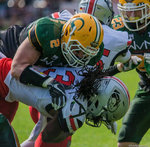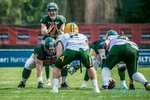


Last fall Tucker Stanley thought his football career was over. As a redshirt senior at Eastern Oregon University, Stanley figured he’d simply reached the natural conclusion of a prep football career that had spanned 17 years.
After a pro-day at Eastern Oregon University failed to garner any lasting interest from NFL teams or even the Canadian Football League, Stanley, a 2012 Napavine graduate, returned to Lewis County to sell real-estate as part of the family business.
Still, after he learned about the German Football League, Stanley and a few college teammates began to look into the possibility of taking their talents to the land of beer and sausages. Rules governing GFL roster construction are strict though and limit teams to four American players in total, with only two Americans allowed on the field at any time.
“I kind of had given up hope after a couple of months of messaging and teams that it just hadn’t worked out with for various reasons, and others that just hadn’t responded at all. And then I got a message back from this team that said ‘We need an outside backer,’” recalled Stanley.
That team, the Cologne Crocodiles, had suffered a spate of injuries and extenuating circumstances, including a player who had suffered a death in the family that required him to take a leave of absence. For Stanley, it seemed that the stars had finally aligned to bring his football career back to life, so long as he could figure out how to free himself once more from the staggering gravitational pull of Lewis County.
“I had to really tie some ends together within about seven days and get some things in order and get on a plane and leave,” explained Stanley. “It wasn’t really ideal timing for me but from what I’d learned it was something where you couldn't really be too picky.”
Once Stanley arrived in Germany on April 10 of this year things quickly started to fall into place. He’s earned a spot as a starting linebacker and leads the team in tackles with 67 (the next nearest total is 39). Those defensive statistics include two sacks and ten tackles for a loss in eight games, and he has ranked as high as third in the entire league in total tackles this year.
Stanley, who was a walk-on at EOU before becoming a team captain as a senior, says that the GFL reminds him of the NAIA or Division II level of collegiate football in America. However, he says, like European soccer leagues, the talent tends to be stashed away on the wealthier top tier teams, like the New Yorker Lions.
“We’re getting into the tougher part of our schedule and the size of the teams has changed dramatically from the bottom tier of the league to the top,” said Stanley. “When you play the top tier teams in the league, there is no difference in what you’d see at the upper levels back in the States.”
Stanley said last week, the Crocodiles faced a slot receiver on the Dresden Monarchs who played for the University of Indiana before playing a preseason with the San Diego Chargers. Other teams in the league also feature Division 1 talent and players who have spent time in NFL or CFL camps.
“They usually try to get Division I (American) guys because they only get two players on each side,” noted Stanley.
Currently the Crocodiles are sitting in fourth place in their league standings with a 5-2-1 record, which would qualify them for the playoffs if the season ended today. Stanley noted that this is the Crocodiles’ second season in the highest division of GFL play and explained that like European soccer leagues, the last place team can be relegated to the lower division each year. “Realistically, I think our goal is to make the playoffs… I think that would be a very successful year,” said Stanley.
In the three months since his arrival, Stanley has been doing his best to acclimate to the local scene. He and his American roommate, quarterback Brad Strauss, share a two-room apartment as well as an Audi, which are both provided by the team. Stanley says that a top-flight American quarterback can make upwards of $2,000 per month playing in the GFL.
“I’m still not on the Germany time zone,” said Stanley, who operates nine hours ahead of the Pacific Northwest. He says it’s usually 1 a.m. in Germany before he gets a chance to chat with his family and friends via Facebook messenger.
“Luckily the schedule is everything is in the evening. So that’s kind of my strategy is that I just stay up late and get up late,” noted Stanley, who typically starts his day by heading to a local restaurant that sponsors the Crocodiles for a late breakfast during what most people would consider lunch time.
One of those sponsors is the Hard Rock Cafe where Stanley can reliably find fodder that reminds him of your standard American serving. The other team sponsor is a locally owned brat and brewhouse with plenty of sauerkraut and suds to spare.
“They want you to drink beer. The beer is cheaper than water,” laughed Stanley.
He says that cultural acceptance of a good old barley pop is one of the things that has taken a while to get accustomed to.
“It’s a little bit of a culture shock coming from the states to Germany to play football because after the game on the bus there’s always three or four cases of beer that they bring for the ride back,” said Stanley. “I don’t know if that’s the culture here or just the level of football we’re playing.”
While he’s elated to be extending his career on the gridiron, Stanley says this will likely be his last hurrah strapping on the pads and laying licks on opposing offenses. He says his top incentive in taking the opportunity to play in the GFL is to be able to travel around Europe before coming back home to start his real life and career in real estate.
“Football, if it can give me one more thing before I hang up the cleats, its would be to travel Europe and the countryside and see the world,” said Stanley.
So far he’s been doing his best to make that goal reach fruition.
He’s already toured Switzerland and been to the Isle of Man for its famous motorcycle races. He’s also been to Vienna, Austria and Budapest and is planning a trip to Italy soon.
“We’ve been taking advantage of our days off, for sure,” said Stanley. “It’s not the same as American football as far as how demanding it is coming from college where it’s all meetings, and meetings, and weights, and meetings, and practice, and then games. Here you’ve got a little bit more of an open schedule because we’re just over here to play football, as opposed to our teammates who have other things in their lives to do.”
The very first place on Stanley’s travel checklist was Amsterdam so that he could “see what all the hype was about.” It’s safe to say the place left an impression on him.
“Amsterdam is hard to describe. You want to compare it to Vegas but it's certainly not Vegas. It’s got a weird, weird, open vibe to it. I think they really pride themselves on the whole sex, drugs, and rock and roll thing,” said Stanley. “When you go to Amsterdam it’s all cobble stone, and canals and tight alleyways and of course the district is full of things that you wouldn’t just walk around and see in America in the open… It was kind of entertaining. I will go back to Amerstream again, that’s for sure.”
As an American in the GFL, Stanley certainly stands out. That mostly because each American player is required to have a large A on their helmet and uniform in order to distinguish them from other players during the game. Officials also conduct a passport check before each game to make sure that only four Americans are present on each team.
“It’s funny because the scouting reports are all just, ‘Okay, here’s their American and here’s what we’re going to do,’” said Stanley. “As far as on the field the Germans are real friendly. The other Americans are real nice guys, too. We kind of have a mutual bonding because they only allow a couple of us per team so we all feel really lucky to be here.”